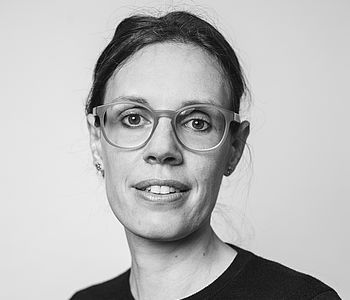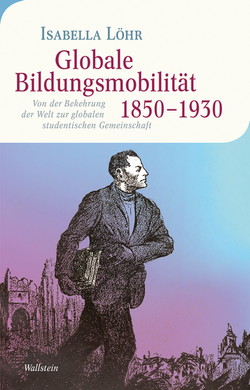Prof Dr Isabella Löhr | Associated Researcher

Home Institution
:
CMB
|
Position
:
Professor, International History of the Twentieth Century at the Freie Universität Berlin / Head of Department "Globalisations in a Divided World", Leibniz Centre for Contemporary History Potsdam (ZZF)
|
Disciplines
:
History
|
Biography
Isabella Löhr is the Chair of International History of the Twentieth Century at the Friedrich Meinecke Institute and head of the “Globalisations in a Divided World” department at the Leibniz Centre for Contemporary History in Potsdam (ZZF). Before joining the faculty at the FU in June 2023, she accrued extensive experience in teaching, research, science management, and interdisciplinary collaboration at various national and international institutions, including as a professeur invité at the Ecole normale supérieure in Paris and as a visiting scholar at Columbia University in New York.
She earned her doctorate at the University of Leipzig in 2008 with a dissertation on the global history of intellectual property rights from the 1880s to the 1950s. She subsequently worked as an assistant professor of modern and contemporary history at the University of Heidelberg and at the University of Basel, where she served on the faculty of the Institute for European Global Studies. Later, as a senior researcher at the Leibniz Institute for the History and Culture of Eastern Europe, she worked on a project addressing the history of modern international law in Eastern Europe. At the Institute for Migration Research and Intercultural Studies (IMIS) at the University of Osnabrück, she headed “The Production of Knowledge on Migration” junior research group. There she also wrote her second book, namely on student mobility from the 1850s to 1930s, which marked the completion of her postdoctoral studies at the Philipps University of Marburg. Most recently, from 2021 to 2023, she was the deputy director of the French-German Centre Marc Bloch in Berlin, an interdisciplinary research centre for the humanities and social sciences.
Researchtopic
We live in a complex world characterised by fundamental tensions between nationalisation and internationalisation, as well as by manifold activities that produce a dense network of global interactions and (sometimes violent) divides. In my teaching and research, I seek to understand the mechanisms and dynamics behind these phenomena, which are often clear and present in everyday life, and am interested in finding ways to represent and explain them. To this end, I combine social and cultural history with a praxeological and actor-centred perspective: I investigate the making, rearranging, and breaking of global constellations by concrete actors and ask how border-crossing groups emerge, how internationally relevant thematic fields materialise, and which people or groups are excluded from these processes due to ethnic, social, political, and/or religious categorisations. My research focuses on the period spanning from the late 19th to the early 21st century. In spatial terms, I focus on Germany and Europe – that is, both Western and Eastern Europe – which I examine in their international and global contexts. The major topics of my research are migration and mobility, international law and humanitarian aid, and the history of international movements. My studies are embedded in an epistemic reflection on my own work and always include methodological and conceptual reflections on the challenges and pitfalls of a European perspective on international and global history.
Research interests:
- German and European history from the late 19th to the early 21st century in international and global contexts
- Migration and mobility
- The history of modern international law and humanitarianism
- The history of globalisation, with special focus on international movements and ecumenism
- Interdisciplinary knowledge research
Projects
Here you will find an overview of current projects.
Scaling the Transnational: Entangled Political Imaginaries and Practices in East and West Europe [STEPPE]
For the last two decades, the European Union has been faced with unprecedented political challenges. The uninhibited assertion of “illiberal” politics, in the name of national values considered different from the “liberal values of the West,” and the contestation of fundamental democratic principles has been constructed by its promoters as an expression of defense of national specificities. These developments have been explicitly formulated in resistance to cultural and political norms considered exogenous and hegemonic, justifying thereby a political agenda of restriction of freedoms and control of institutions. As a result, two opposing camps have been conveniently portrayed: “liberal democracies” and “illiberal regimes.” The East/West binary that underlies this discourse and the political responses to it, gives this crisis of confidence between European states a geopolitical and territorial dimension. It reiterates an old distribution of roles: East Central and Southeast European countries are suspected by the Western states of being politically and socially and lacking democratic traditions; in return, the “West” is accused of wanting to give lessons and of being primarily interested in imposing its domination.
However, in the West as in the East, comparable forms of polarization of public opinions are observable. All over Europe we see a growing divergence between the votes of “cosmopolitan” metropolises and those of rural areas or small towns, which claim to defend traditional national values. The conflict orbits around the social and institutional histories as well as the political imaginations and languages of its protagonists; it is also the result of the strategies of political movements and their actors, situated at different levels of power, who exploit these symbolic and actual divisions. Therefore, in order to get out of the antagonism and make the European democratic project more resilient, the project aims at going beyond binary narratives of the East-West-divide by investigating and situating the underlying reasons of these dichotomous perceptions and role patterns, both with regard to ideological representations and actual experiences. This is all the more relevant as the last decades saw a general drive toward the „transnationalization“ of different political movements from the antiglobalist left through the social democrats, liberal reformists all the way to the radical rightist „identitarians.“
Abandoning the strictly national frameworks in the study of contestations of liberal democracy, we adopt an actor- and network-centered perspective on different spatial levels: from the international level of the circulation of ideas and their speakers, to the national and local levels of militant mobilization or political affiliation. We are interested in the social fields in which different types of actors (including political, legal, academic, societal or economic stakeholders) interact and which they configure, and in the justifications they mobilize to account for their actions, as well as the multiple exchanges taking place among them. In order to understand these processes, we also seek to investigate how the transnational interaction of political, legal and scientific actors was/is constitutive of the creation or reproduction of an East-West dichotomy, and how we can go beyond it.
From this perspective, we seek to shed new light on the interplay of the national political infrastructure and the transnational transfers of ideology, organizational knowhow, and mobilizing strategies. From this vantage point, our project intends to reveal the multi-dimensional aspects of political movements in Europe. The complexity of the processes at work requires a multidisciplinary and multi-layer perspective, combining historical, sociological, and ethnographic methods.
We identified four different research directions, reflecting the principal spheres of encounter:
- Transnational Rule-of-Law Activism (hosted at the Institute of Political Science at Leipzig University, Leipzig/ Germany)
The first stream deals with transnational rule-of-law activism by scrutinizing the interplay of East Central Europe activists with their Western peers in the establishment of an EU-wide understanding of rule of law. Liberal constitutional states are based on higher order of political norms where values, institutions, and procedures are beyond the immediate reach of temporary electoral majorities. They represent either a priori rules of a political regime (i.e. Germany’s “eternity clause”) or a framework that can be revised under quasi-consensual, deliberative procedures. - Transnationalization of IIliberal Movements (hosted at CEU-Democracy Institute, Budapest/ Hungary)The second stream focuses on the transnational connectivities of right-wing contenders of liberal democracy, looking at the circulation of ideas as well as the networks that transmit them. While the usual representation of ideological interaction shaping East Central European political thought is one-directional (West-East), this component of our project sheds light on much more complex entanglements and an inherent multi-directionality of ideological transfer.
- Leftist Connectivities – Swimming Against the Stream? (hosted at New Europe College NEC, Bucharest/ Romania)
The third direction focuses on the political and intellectual connectivities of the “new left.” All over Europe, the leftist political imaginaries are increasingly squeezed by the polar opposition between liberal centre and right-wing populism that is reshaping much of the political and ideological landscape. In this project, we leave aside the established centre-left parties and organizations but focus on the anti-systemic leftist ideologies and practices. Here no East-Central European exceptionalism is assumed, but rather a European-wide crisis of the left and a search for new political ideas and frameworks of mobilization. - Between Normalization and Exoticism: Academic Transfers and Social Agency (hosted at Centre Marc Bloch, Berlin/ Germany)
In this stream we intend to look at the multi-layered dialogue of Western and Eastern European academic cultures with a special focus on the way Eastern Europe (and the Balkans) have been framed in the last two decades in relation to the Western European system of references.
(STEPPE) Scaling the Transnational: Entangled Political Imaginaries and Practices in East and West Europe
The European Union is facing immense political challenges. In many countries, democratic principles are being questioned and “illiberal policies” are being explicitly positioned as a defense of national values against the “liberal values of the West”. “Liberal democracies” and ‘illiberal regimes’ are thus juxtaposed and old dichotomies are revived: while Eastern Europe is said to have a democratic and rule of law deficit, Western Europe appears to be merely interested in maintaining its discursive and political dominance. This East/West opposition lends a geopolitical and territorial dimension to the crisis of confidence between the European states.
Against this background, the project examines the transnational dimensions of political movements and ideological conflicts in Europe. The BMBF project started in July 2024 at the Centre Marc Bloch. It questions the dichotomy between Western and Eastern Europe as an analytical category for understanding historical and current social developments and political conflicts.
STEPPE addresses multidirectional transfers and the underlying experiences that have shaped European societies. East-West interdependencies are highlighted as a central but often overlooked component of European political culture and social ideas. Four thematic approaches structure the project: three forms of ideological transfer (liberal, illiberal, left) as well as transnational academic networks that both observe and shape the exchange.
For this purpose, an international network with partners in Central Eastern and South Eastern Europe is being established and expanded. As part of regular network meetings, a fellow program with short-term fellowships for young researchers and targeted training, a follow-up application for EU research funding is being developed in the project.
Globale Bildungsmobilität 1850-1930. Von der Bekehrung der Welt zur globalen studentischen Gemeinschaft
October 01, 2021Isabella Löhr
Moderne europäische Geschichte, Bd. 21
Edition: Wallstein Verlag
Collection: Moderne europäische Geschichte, Bd. 21
ISBN: ISBN 978-3-8353-5020-5
Studieren im Ausland ist heute scheinbar normal. Die meisten Programme versehen dies dabei mit dem Auftrag, internationale Verständigung zu fördern. Isabella Löhr analysiert, wie diese Verbindung von Bildungsmobilität und Verständigung im Verlauf des Ersten Weltkriegs entstand. Die Europäische Studentenhilfe war eine aus der studentischen Missionsbewegung des 19. Jahrhunderts kommende humanitäre Organisation, die ab 1920 in den Universitätsstädten im östlichen Europa tätig wurde. Sie verband Bildungsmobilität mit humanitärer Hilfe und transformierte studentische Mobilität in ein gesellschaftspolitisches Sujet, das innerhalb weniger Jahre zu einem Gegenstand bildungspolitischer Interventionen auf globaler Ebene aufrückte. Die humanitäre Sorge für Studierende diente nach dem Krieg als Modell für eine Verständigungspolitik, die ein Denken in Kategorien von Nation, Minderheiten und Rasse/race als großes Problem der Zeit ansah und das Ideal einer globalen studentischen Gemeinschaft als Lösung propagierte. Ein wesentliches Element der modernen Universitätsausbildung - Mobilität für den Wissenserwerb - wurde damit von religiösen und humanitären Handlungslogiken und Weltsichten geprägt.
Publications
For the list of publications please visit: https://zzf-potsdam.de/en/user/937
